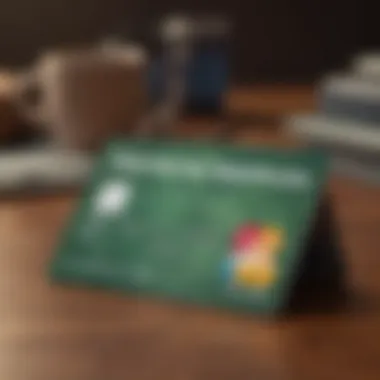Prepaid Visa Cards for Minors: A Complete Guide


Intro
In today’s digital age, where cash seems to be taking a back seat, prepaid Visa cards have become a popular tool, especially for younger audiences. These cards serve as a gateway for minors to grasp financial concepts early on. However, while the convenience of these cards is pretty clear, understanding the ins and outs takes a bit of digging.
This guide dives into the world of prepaid Visa cards tailored specifically for minors. You’ll learn about their benefits, the limitations they hold, practical applications in daily life, and how they can foster a sense of financial responsibility. With parents increasingly seeking methods to educate their children about money management, prepaid cards can be an effective way to introduce basic financial literacy.
Definitions and Terminology
Understanding the terms related to prepaid Visa cards is crucial in navigating this topic. Here’s a rundown of some common financial jargon that will pop up in this discussion:
Prepaid Visa Card
A prepaid Visa card is loaded with a specific amount of money upfront. Unlike traditional credit or debit cards, they don't hook into an existing bank account nor do they allow spending beyond the initial loaded amount.
Financial Literacy
This refers to the ability to understand and apply various financial skills effectively, including budgeting, investing, and comprehending interest rates. For minors, acquiring this knowledge early can lead to informed financial decisions down the road.
Transactions
Every time a prepaid card is used, it processes what is called a transaction. This term simply refers to any activity where funds are moved, like purchases at a store or online.
Fees
Many prepaid cards come with different types of fees, such as activation fees, monthly maintenance fees, or withdrawal fees. Understanding these helps in making an informed choice about which card to use.
"Education is the most powerful weapon which you can use to change the world." – Nelson Mandela
These terms set the stage for further exploration into the realm of prepaid Visa cards for minors.
Significance of Prepaid Visa Cards for Minors
Prepaid cards can play a pivotal role in teaching young individuals essential money management skills. They can help foster a sense of independence, as minors can learn to manage their own funds instead of relying solely on parents or guardians. This hands-on experience can significantly enhance their understanding of budgeting and spending wisely.
How Prepaid Cards Benefit Minors
- Controlled Spending: Parents can load a specific amount onto the card, allowing minors to spend without the risk of overspending.
- Financial Awareness: Using these cards gives minors real-world experience about managing money, which books alone can't teach.
- Safety: Carrying a prepaid card can be safer than carrying cash, reducing the risk associated with losing cash.
Limitations to Consider
While there are notable benefits, it's also essential to consider the limitations of prepaid Visa cards for minors.
- Card Limits: There’s generally a cap on how much can be loaded onto these cards, restricting larger purchases.
- Fees and Charges: As mentioned, there can be a range of fees tied to these cards that may not be apparent at first glance.
- Limited Credit Building Options: Unlike credit cards, prepaid cards do not help in building a credit history.
Ending
Navigating the waters of financial literacy can be complicated, especially for minors. Prepaid Visa cards provide a unique opportunity for young individuals to engage with their finances in a practical way.
By understanding the nuances—benefits, limitations, and terminology—both parents and minors can approach this financial tool with the right mindset. This foundation can serve as a stepping stone toward more advanced financial understanding as they grow.
Understanding Prepaid Visa Cards
In today's digital age, where cash seems to be taking a backseat, understanding prepaid Visa cards is becoming essential. These cards are not just for adults anymore; they are becoming a viable option for minors as well. This part of the article delves into the intricate details of what prepaid Visa cards are, how they operate, and why they can be crucial tools for younger users.
Definition and Mechanism
A prepaid Visa card is essentially a payment card that is loaded with a specific amount of money in advance. Unlike credit cards that allow users to borrow money up to a limit, and debit cards that are linked directly to a bank account, prepaid cards must be loaded with funds before they can be used. This feature can promote responsible spending habits, as minors can only use the funds that have been preloaded onto their cards.
One of the key mechanisms of prepaid cards is that they provide a safe way for minors to engage in financial transactions. When young individuals use these cards, they are not exposed to the risks associated with cash handling. Additionally, transactions made with prepaid cards do not typically influence credit scores, making them a less risky option for parents concerned about their child's credit history.
Distinction Between Prepaid Cards and Other Types


Understanding the differences between prepaid cards and other types of payment options is crucial for parents contemplating introducing their children to financial tools. Here’s a closer look:
- Prepaid Cards vs. Debit Cards: Debit cards draw directly from a bank account. If a minor mismanages a debit card, it could inadvertently lead to overdraft fees. Prepaid cards, in contrast, limit spending to the balance available, minimizing the risk of overspending.
- Prepaid Cards vs. Credit Cards: Credit cards involve borrowing money, and if not managed properly, they can lead to debt. Prepaid cards allow users to spend only what they have, providing a clear boundary that can help minors learn to budget effectively.
- Prepaid Cards vs. Gift Cards: While gift cards are typically for a specific store or service and may have expiration dates, prepaid Visa cards can be used anywhere that accepts Visa. This flexibility makes them a more practical choice for everyday transactions.
By comprehensively understanding these distinctions and the underlying mechanics of prepaid Visa cards, parents can make informed decisions about equipping their minors with these financial tools. The journey toward financial literacy begins here, as these cards can serve as an excellent stepping stone into the world of personal finance.
Why Prepaid Visa Cards for Minors?
In today’s fast-paced world, the need to groom the financial acumen of the younger generation has never been more pressing. This is where prepaid Visa cards come into play. They offer a practical and structured way for minors to engage with money and understand its implications and management. Instead of just handing out cash or leading them to traditional bank accounts, these cards provide an intermediary solution that assists in financial education. What is crucial to grasp here is that these cards aren't merely about spending; they become a fundamental tool in navigating financial literacy.
Teaching Financial Responsibility
One of the primary advantages of prepaid Visa cards is their ability to instill a sense of financial responsibility in minors. When a child is equipped with a card that has a set limit, it opens the door to conversations about spending choices, budgeting, and saving. For instance, if a teenager receives a prepaid card loaded with a specific amount for the month, they will need to assess their desired purchases. This not only teaches the importance of budgeting but also lays the groundwork for making informed decisions about where and how to allocate resources.
To solidify this concept, parents can also engage in reflective conversations after the spending period. Questions such as "Did the spending align with your needs?" or "How did you feel about the choices made?" can prompt critical thinking and self-assessment among youth, leading to a deeper understanding of financial responsibility.
Encouraging Budgeting Skills
Budgeting can often seem like a daunting task to youngsters. However, prepaid Visa cards sidestep that intimidation. By using a prepaid card, minors can literally see the impact of their spending in real-time. For instance, when they spend at a coffee shop, they instantly observe how much their balance decreases. This immediate consequence fosters better budgeting habits, as young cardholders become aware of their financial limits.
Parents might consider a few strategies to help reinforce budgeting skills:
- Create Specific Categories: Help minors identify different spending categories such as entertainment, groceries, and savings. This can help them allocate funds appropriately.
- Encourage Tracking: Use mobile or physical tools to track spending. This can transform into a game, making it more engaging for kids.
- Discuss Goals: Setting long-term or short-term savings goals can encourage minors to budget more effectively so they can reach those objectives.
Fostering Independence
The nature of prepaid Visa cards not only promotes financial literacy but also nurtures a sense of independence and autonomy among minors. Unlike the traditional reliance on parental control, these cards allow children to make choices and learn from their mistakes in a safe environment.
For instance, a child might naively spend too much on a video game and find themselves short for a social event. This scenario clearly illustrates how mistakes can directly affect one’s financial capacity, reinforcing the importance of thoughtful decision-making.
Moreover, as youngsters wield their prepaid cards, they also get to experience the practicalities of financial transactions. From purchasing items online to dealing with cashiers in stores, each interaction builds their confidence and competence in handling money. To add depth, parents can encourage their children by discussing real-life financial scenarios and how they might approach similar situations in their own lives.
"Financial literacy doesn't just begin when you're an adult; it grows from the seeds you plant in youth."
Overall, the combination of teaching responsibility, fostering budgeting skills, and encouraging independence establishes a strong foundation for minors to navigate future financial challenges. The prepaid Visa card is more than just a tool; it's a means of preparing the younger generation for a successful financial trajectory.
Legal Considerations
Navigating the landscape of prepaid Visa cards for minors involves a delicate interplay of legal factors, which stand as crucial starting points for any responsible consideration of these financial tools. Understanding these nuances not only empowers parents but also holds significance in shaping the financial habits of the next generation. This section will drill down into important aspects such as age restrictions, parental consent requirements, and the broader regulatory framework governing the use of these cards.
Age Restrictions
When it comes to age restrictions, the rules vary significantly among providers. Generally speaking, most prepaid visa card issuers set a minimum age limit, often around 13 years, for obtaining a card with a parent or guardian’s approval. The idea here is to ensure that young individuals are not just old enough to understand basic money management concepts, but also that they can adhere to the responsibilities that come with having their own card.
Moreover, some financial institutions might make it a requirement for the child to be at least 18 before they can hold the card solely in their name. This prevents minors from facing the full brunt of financial liability should something go awry. Parents should be notably aware of these policies as they can vary dramatically, and choosing the right card could hinge on a child's age.
Parental Consent Requirements
Parental consent is not merely an afterthought; it’s a critical legal assurance. Most prepaid Visa cards for minors require a parental signature or endorsement to activate the account. This stipulation exists to bolster security steps that permit parents to retain a guiding hand in their child’s financial dealings. While it is a hassle-free procedure, it serves a bigger role in cultivating responsible financial behaviors.
Parents must now only authorize the use of the card but also legitimately share in the responsibility of managing it—this includes monitoring transactions and understanding any fees involved. This two-fold approach lends an extra layer of protection, keeping children from making hasty financial decisions without parental oversight.
"Prepaid cards for minors don't just serve as a financial tool; they're a means to facilitate meaningful conversations about money management within families."
Regulatory Framework
When delving into the broader regulatory framework, it’s essential to consider how various laws impact the issuance and use of prepaid Visa cards for minors. Regulations set in place by the Consumer Financial Protection Bureau (CFPB) and other watchful agencies ensure that issuers cannot engage in predatory practices or charge excessive fees without proper transparency.
For parents, one key takeaway is that these cards are often subjected to the same stringent rules that govern adult credit and debit cards, adapting these standards to cater specifically to younger users. This means that any policies related to disclosures (such as fees or terms of service) are typically aligned with existing regulations to guarantee fair treatment.
Additionally, the market continually evolves to accommodate emerging concerns—like online fraud or identity theft—ensuring that minors and their financial data remain protected. The intersection of these rules represents a commitment to safeguard both parents and children as they navigate the digital age of finance.


In sum, understanding the various legal considerations associated with prepaid Visa cards for minors is fundamental. This ensures parents make informed decisions while also empowering their children to engage positively in financial management from an early age.
Features of Prepaid Visa Cards for Minors
When considering financial tools for minors, prepaid Visa cards emerge not just as a trendy choice but as a strategic asset for encouraging essential money management skills. These cards come loaded with features tailored to both the young cardholder and their guardians, marrying independence with oversight in a way that few other financial products offer. Let's delve into some of the important features that make these cards particularly valuable.
Reloadable Options
One of the standout characteristics of prepaid Visa cards is their reloadable nature. Unlike a set amount of cash in a piggy bank or a one-time gift card, these cards allow parents and guardians to add funds as needed. This feature exemplifies a practical aspect of budgeting; it teaches minors to recognize their spending limits while allowing for flexibility.
Imagine a scenario where a child receives their card, loaded with a specific sum for the month. As the weeks pass, they can see their balance dwindle. By bringing them into the process, parents can guide discussions about when it might be best to reload the card and how they can motivate themselves to save some money for treats later. Reloading can be done easily online or via an app, reinforcing digital literacy as well.
Mobile App Integration
In this age of technology, having a mobile app integrated with a prepaid card is almost a prerequisite. Many providers ensure that real-time tracking of spending is available, giving minors a clear view of their financial activities at all times. This can significantly aid in both accountability and learning.
Through the app, cardholders can categorize their purchases, receive notifications of spending, and even set savings goals. For instance, if a kid is saving for the next video game release, the app can provide reminders or updates on how much they have left to save. This instant access to spending data means that lessons on finance are not just theoretical; they are a tangible part of daily life.
Parental Controls
Another noteworthy feature is the parental controls that many prepaid Visa cards come equipped with. This tool empowers parents to oversee their child’s spending without stripping away the lesson of responsibility. By enabling restrictions on certain types of purchases, like gambling sites or adult-themed content, the card acts as a safety net.
Furthermore, some cards allow parents to receive alerts on expenditures that exceed a certain amount or are made in specific categories, facilitating meaningful conversations about money.
With the right balance of oversight and independence, minors can navigate their financial world while staying anchored by responsible adult guidance.
In summary, the features of prepaid Visa cards specifically designed for minors focus on creating a blend of independence and parental supervision. The reloadable function fosters budgeting skills, the mobile app encourages real-time financial awareness, and parental controls ensure safety. These elements collectively create an environment where young individuals can learn, experiment, and grow into financially savvy adults.
Selecting the Right Prepaid Visa Card
When it comes to choosing a prepaid Visa card for minors, making the right selection is key. This decision lays the groundwork for teaching young people about managing money. Picking a card that suits a minor’s needs means being mindful of several factors. It involves understanding how different options function, the associated costs, and the benefits they offer. In the long run, the right choice can help children grasp essential concepts of financial literacy early on, preparing them for a financially responsible adulthood.
Comparative Analysis of Market Options
Diving into the marketplace reveals a plethora of prepaid Visa card options specifically designed for minors. Brands like Greenlight, GoHenry, and FamZoo offer varied features to cater to different requirements.
- Greenlight is user-friendly, boasting a robust mobile app that lets parents manage funds and track spending. Its focus on chores and allowances resonates with parents who want to instill a work ethic in their children.
- GoHenry takes it a step further with customizable debit cards that help kids learn about budgeting through practical exposure. The interactive platform encourages minors to engage actively with their money.
- FamZoo offers a versatile approach, combining the concept of family banking with prepaid cards. It encourages collaboration among family members around saving and spending together.
Researching these market options can help determine which features best align with parenting styles and financial goals.
Fee Structures
Another vital consideration involves examining the fee structures attached to different prepaid cards. While some options may appear attractive at first, they can turn into a money pit if hidden fees start piling up. Here’s a breakdown of typical fees you should be aware of:
- Monthly maintenance fees: Some cards charge a fee just for holding the card.
- Reload fees: Adding money to the card can sometimes lead to charges.
- ATM withdrawal fees: Using ATMs outside their network may incur fees.
- Foreign transaction fees: If the card is used overseas, think twice about potential extra charges.
Opting for a card with minimal fees will ensure more of your money goes towards teaching your child about managing their finances instead of lining the pockets of companies.
Rewards and Incentives
The icing on the cake with prepaid Visa cards can be found in their rewards programs. Many cards offer incentives that can make managing money more exciting for minors. Consider options that include:
- Cashback Offers: Some cards provide a percentage back on purchases, which can make spending more lucrative.
- Point Systems: These may allow minors to accumulate points redeemable for prizes, thereby getting them motivated to save.
- Goal Setting Features: Cards that include tools to help minors save for specific goals encourage disciplined budgeting.
"The right prepaid card not only provides a lesson in money management but also can instill a real motivation to save and achieve personal financial goals."
Ultimately, when selecting the right prepaid Visa card, parents should balance the features with their child's needs, encourage responsible spending, ensure transparency with fees, and look for those irresistible rewards that turn learning into an enjoyable adventure.
Potential Risks and Limitations
When it comes to introducing minors to financial tools like prepaid Visa cards, it’s crucial to take a good, hard look at the potential risks and limitations involved. While these cards can offer a practical way to manage money and teach financial responsibility, they also come with their share of pitfalls that can catch many off guard. Here, we explore several of these risks in detail.


Inherent Fees
Every financial product has its price tag, and prepaid Visa cards are no exception. The fees associated with these cards can vary widely depending on the issuer. Some of the more common fees include activation fees, reloading fees, monthly maintenance fees, and withdrawal fees at ATMs.
It’s easy to overlook these charges, especially when a parent is trying to provide a tool for their child’s financial education. However, if a minor uses their card frequently to make purchases or withdraw cash, these fees can accumulate quickly, leading to a situation where the convenience of the card diminishes its value. Therefore, before choosing a card, it’s important to read the fine print regarding fees and consider their impact on the overall usability of the card.
Overdraft Situations
Though prepaid cards generally don’t allow for overdraft in the same way a credit card does, there can still be scenarios where minors might face similar situations. For instance, if a minor tries to make a purchase that exceeds the balance on their card, this can lead to embarrassment at the checkout counter. Additionally, some card issuers might allow for transactions to go through even if it exceeds the balance, often incurring fees that can lead to a negative balance.
In these cases, it’s vital for parents to explain the importance of knowing their balance and monitoring transactions diligently. Teaching minors to maintain awareness of their spending is an invaluable lesson that extends beyond the use of prepaid cards.
Fraud and Security Concerns
Like any financial product, prepaid Visa cards are not immune to risks related to fraud and security. Minors may not always be aware of the precautions necessary to protect their card information. They could easily fall prey to phishing scams or unauthorized transactions if they don’t understand the importance of safeguarding their personal and financial information.
Moreover, if a card is lost or stolen, immediate action is required to prevent fraudulent charges. This is where the role of parental guidance becomes particularly significant. Parents should frequently engage their children in discussions about online safety and encourage them to report any suspicious activity related to their cards immediately.
"Education is the most powerful weapon which you can use to change the world." - Nelson Mandela
Addressing these potential risks and limitations head-on can empower both parents and minors to navigate the world of prepaid Visa cards more securely and effectively. By instilling prudence and financial literacy, they can avoid the pitfalls often associated with these financial tools, ensuring that they serve their intended purpose.
Financial Literacy for Minors
Financial literacy for minors is crucial. It lays the foundation for kids to understand money, manage it well, and eventually make informed decisions as adults. When children learn about finances early enough, they’re less likely to fall into debt traps later in life. Prepaid Visa cards can be an effective tool in this journey.
Understanding how to budget, save, and make spending decisions offers several benefits. First, it encourages budgeting skills. Children can practice tracking their expenses with these cards, creating a real-world connection between earning money and spending it. They learn that money isn’t infinite—it runs out if not managed properly.
Second, prepaid cards promote independence. When minors start using these cards, they make their own financial choices. They decide how to spend, what to save, and even how to prioritize their needs versus wants. This creates a more tangible learning experience compared to hypothetical discussions about money.
Teaching the basics of financial literacy through practical means can yield long-term positive behavior towards money management.
Programs and Resources Available
Many programs and resources are tailored to boost financial understanding among minors. Organizations like Junior Achievement offer engaging curricula that tackles financial literacy. They teach kids about budgeting, investing, and the importance of savings through interactive activities.
Some online platforms and apps, such as Greenlight and FamZoo, are designed specifically for families wanting to instill good financial habits.
Additionally, there are workshops held in schools and community centers aimed at teenagers. These workshops often include real-life scenarios, simulations, and collaborative projects to ensure that participants actively engage in their learning.
"Education is the most powerful weapon which you can use to change the world." - Nelson Mandela
Parental Guidance in Financial Education
Parents play a pivotal role in molding their children's financial habits. Open conversations about money, budgeting, and spending are essential. When discussing finances at home, parents can use everyday situations—like grocery shopping or budgeting for a family trip—to illustrate financial concepts.
Support from parents empowers children. Encouragement and guidance can enhance the learning experience from using prepaid cards.
Moreover, parents could set up regular discussions about spending choices and financial decisions, helping children reflect on their habits and improve them over time. Adjusting these discussions based on their age and comprehension level helps maintain relevance and engagement.
By combining practical experience with parental guidance, minors can cultivate a robust understanding of financial literacy, ensuring they are well-equipped to handle money matters as they grow.
Finale
In the constantly evolving landscape of financial education for minors, the role of prepaid Visa cards emerges as significant. This article has journeyed through various aspects of these financial tools, shedding light on their benefits and potential drawbacks. These cards not only serve as a gateway for young individuals to grasp the intricacies of money management but also pave the way for independence.
The summary of key points we've explored reinforces the essential functions that prepaid cards can fulfill. They encourage responsible spending habits, instill the discipline of budgeting, and provide a safe platform for minors to learn about financial transactions without the risks associated with traditional banking methods. By integrating technology through mobile app features, these cards become more than just payment methods; they transform into educational tools that empower minors to become savvy financial navigators in the future.
Summary of Key Points
- Financial Education: Prepaid Visa cards equip minors with practical experience in handling money. They help in establishing a foundation for understanding financial concepts.
- Parental Involvement: These cards often come with features that promote parental oversight, ensuring guidance while allowing minors the freedom to make choices.
- Budgeting and Spending: Using prepaid cards can help minors develop budgeting skills, making distinctions between needs and wants.
- Safety and Security: With built-in protections against fraud and theft, prepaid cards provide a secure way for young users to transact and learn about handling money.
Future Considerations for Minors and Financial Products
As we look ahead, the landscape for financial products aimed at minors will likely continue to change. Technology will arguably play a larger role in how young individuals manage their finances. The adoption of mobile applications linked to prepaid cards indicates a shift towards digital learning environments. Here are some considerations for parents and guardians:
- Innovative Features: Expect more robust parental controls and educational resources integrated into financial products. This evolution reflects a growing recognition of the need to balance oversight with independence.
- Diverse Offerings: The market is moving towards offerings that not only facilitate spending but also encourage savings through features such as automated savings from direct deposits.
- Changing Regulations: With ongoing discussions about financial literacy requirements in schools, products tailored for minors may undergo changes to align with educational standards.
- Informed Choices: As the array of financial products increases, it becomes essential for parents to guide their children in making informed choices that suit their financial habits.
In summary, the closing thoughts underscore the pivotal role of prepaid Visa cards in shaping financial literacy amongst minors, reinforcing their importance as instruments for both education and independence. As this financial tool continues to evolve, its integration into the financial education of young individuals carries strong potential for fostering future generations of responsible financial stewards.















